人教版(2019)必修第一册Unit4 Natural disasters定语从句课件-(22张PPT)
文档属性
| 名称 | 人教版(2019)必修第一册Unit4 Natural disasters定语从句课件-(22张PPT) |  | |
| 格式 | zip | ||
| 文件大小 | 26.4MB | ||
| 资源类型 | 教案 | ||
| 版本资源 | 人教版(2019) | ||
| 科目 | 英语 | ||
| 更新时间 | 2022-12-03 15:36:14 | ||
图片预览

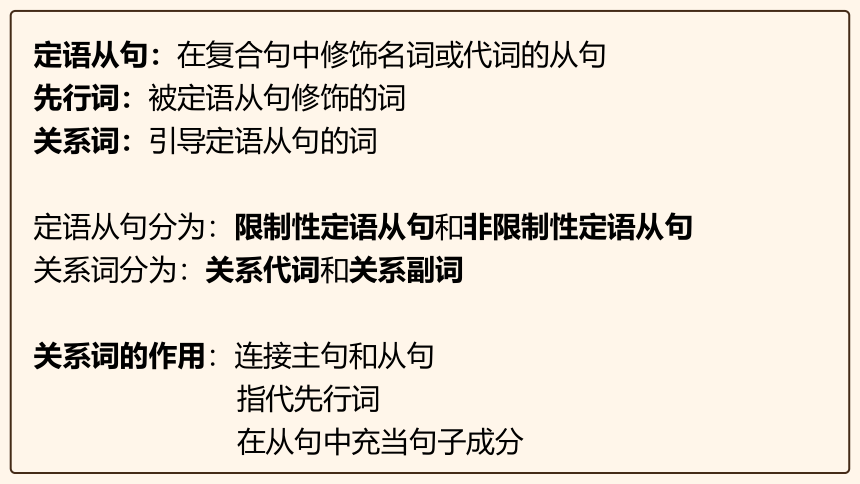
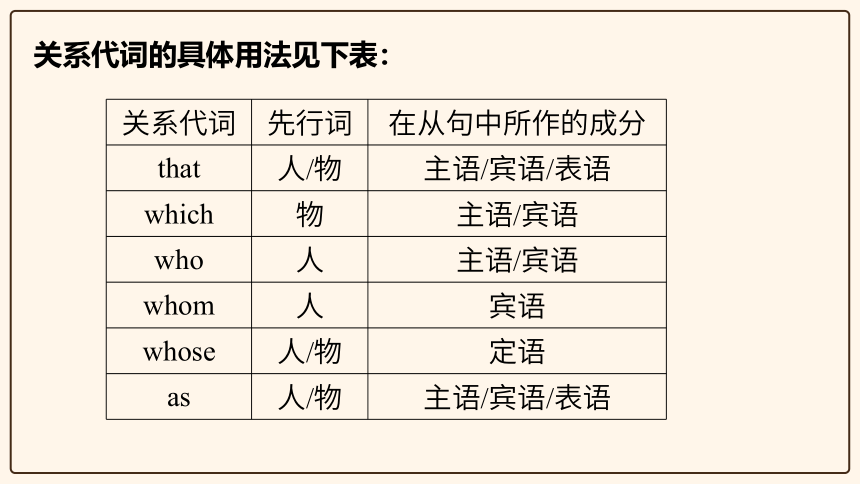
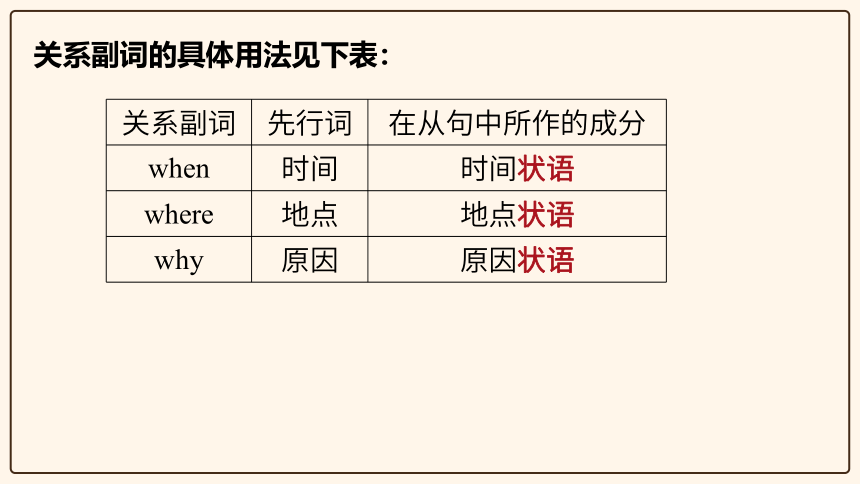

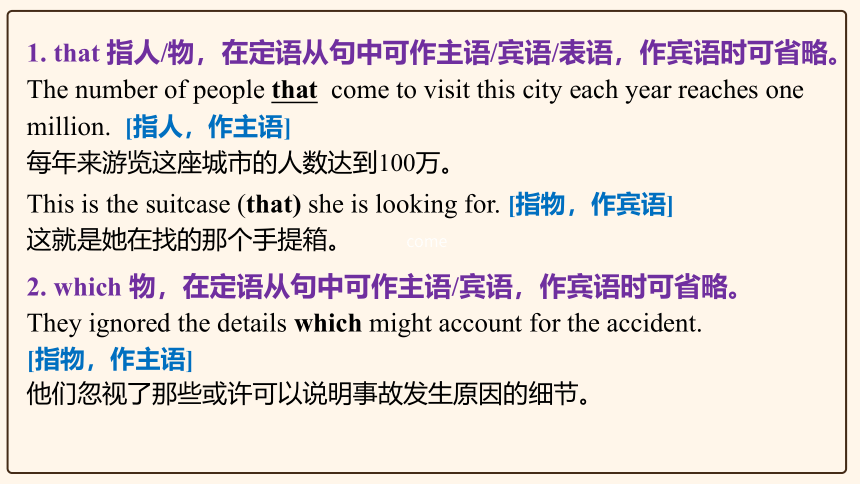
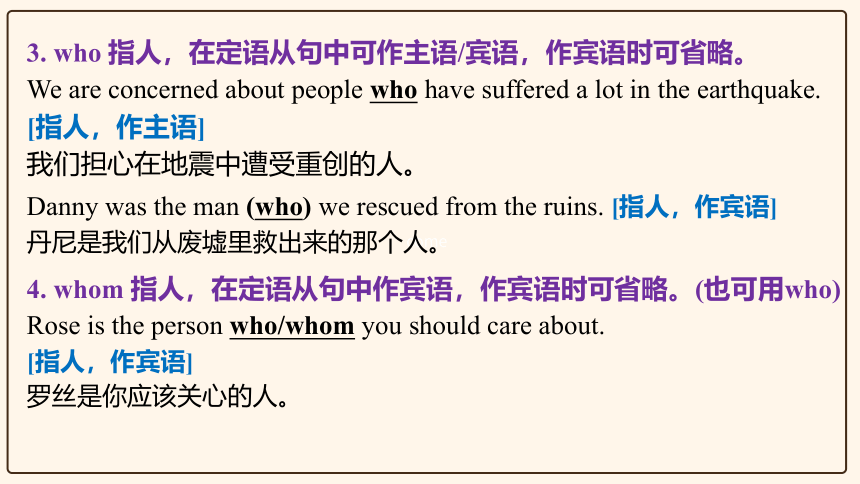
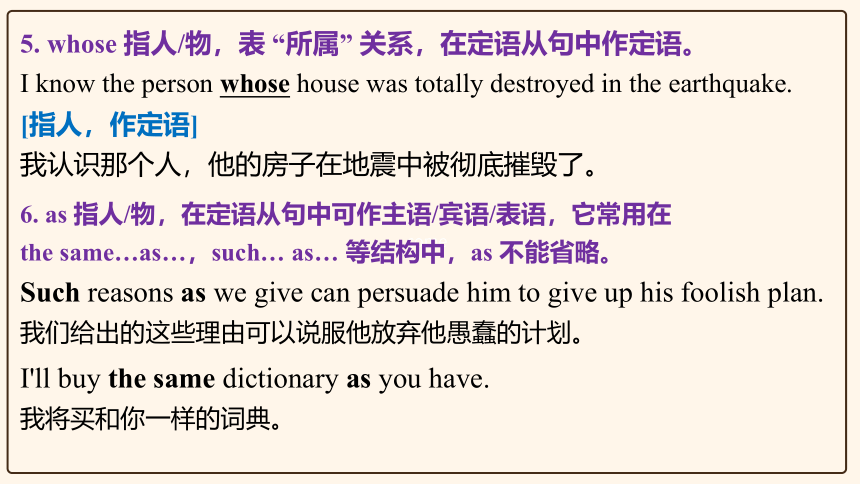
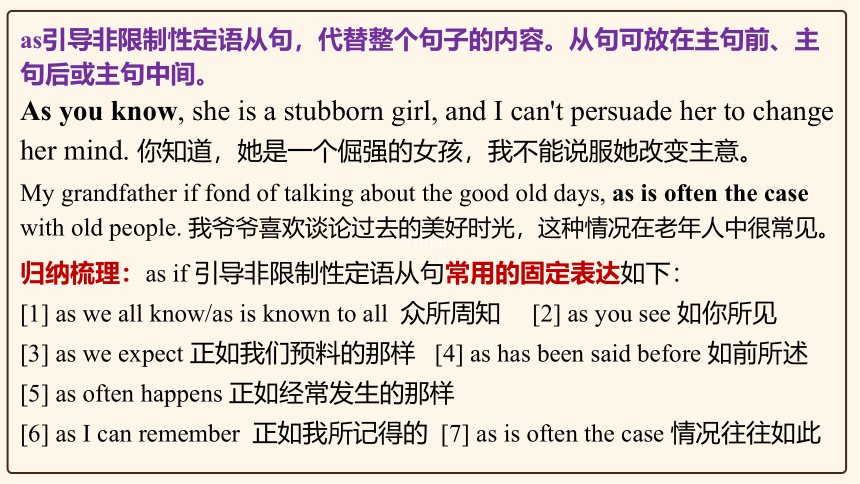
文档简介
(共22张PPT)
Attributive Clause
定语从句:在复合句中修饰名词或代词的从句
先行词:被定语从句修饰的词
关系词:引导定语从句的词
定语从句分为:限制性定语从句和非限制性定语从句
关系词分为:关系代词和关系副词
关系词的作用:连接主句和从句
指代先行词
在从句中充当句子成分
关系代词的具体用法见下表:
关系代词 先行词 在从句中所作的成分
that 人/物 主语/宾语/表语
which 物 主语/宾语
who 人 主语/宾语
whom 人 宾语
whose 人/物 定语
as 人/物 主语/宾语/表语
关系副词的具体用法见下表:
关系副词 先行词 在从句中所作的成分
when 时间 时间状语
where 地点 地点状语
why 原因 原因状语
come
1. that 指人/物,在定语从句中可作主语/宾语/表语,作宾语时可省略。
The number of people that come to visit this city each year reaches one million. [指人,作主语]
每年来游览这座城市的人数达到100万。
This is the suitcase (that) she is looking for. [指物,作宾语]
这就是她在找的那个手提箱。
2. which 物,在定语从句中可作主语/宾语,作宾语时可省略。
They ignored the details which might account for the accident.
[指物,作主语]
他们忽视了那些或许可以说明事故发生原因的细节。
come
3. who 指人,在定语从句中可作主语/宾语,作宾语时可省略。
We are concerned about people who have suffered a lot in the earthquake.
[指人,作主语]
我们担心在地震中遭受重创的人。
Danny was the man (who) we rescued from the ruins. [指人,作宾语]
丹尼是我们从废墟里救出来的那个人。
4. whom 指人,在定语从句中作宾语,作宾语时可省略。(也可用who)
Rose is the person who/whom you should care about.
[指人,作宾语]
罗丝是你应该关心的人。
come
5. whose 指人/物,表 “所属” 关系,在定语从句中作定语。
I know the person whose house was totally destroyed in the earthquake.
[指人,作定语]
我认识那个人,他的房子在地震中被彻底摧毁了。
6. as 指人/物,在定语从句中可作主语/宾语/表语,它常用在
the same…as…,such… as… 等结构中,as 不能省略。
Such reasons as we give can persuade him to give up his foolish plan.
我们给出的这些理由可以说服他放弃他愚蠢的计划。
I'll buy the same dictionary as you have.
我将买和你一样的词典。
come
as引导非限制性定语从句,代替整个句子的内容。从句可放在主句前、主句后或主句中间。
As you know, she is a stubborn girl, and I can't persuade her to change her mind. 你知道,她是一个倔强的女孩,我不能说服她改变主意。
My grandfather if fond of talking about the good old days, as is often the case with old people. 我爷爷喜欢谈论过去的美好时光,这种情况在老年人中很常见。
归纳梳理:as if 引导非限制性定语从句常用的固定表达如下:
[1] as we all know/as is known to all 众所周知 [2] as you see 如你所见
[3] as we expect 正如我们预料的那样 [4] as has been said before 如前所述
[5] as often happens 正如经常发生的那样
[6] as I can remember 正如我所记得的 [7] as is often the case 情况往往如此
come
[误区警示]
[1] 关系代词指代先行词,在定语从句中充当主语、宾语、表语或定语,因此定语从句中不能再出现关系代词所替代的名词或代词。
The film (that/which) we saw it last night was very frightening.
昨天晚上我们看的那部电影非常吓人。
[2] 关系代词在从句中作主语时不能省略,作宾语时可以省略。
Is that the girl (whom/who/that) you spoke of the other day
那就是你前几天所提到的女孩吗?
come
宜用that不用which引导定语从句的情况
[1] 当先行词被序数词或形容词最高级修饰或先行词本身是序数词或最高级时。
The first thing that you should do is to call the police right away.
你应该做的第一件事就是马上报警。
This is the most delicious food that I have ever had.
这是我吃过的最美味的食物。
come
[2] 当先行词是 all, any, little, few, much, everything, anything, nothing, none等不定代词或被这些词修饰时。
All that can be done has been done.
一切能做的都已经做了。
Tell me everything that you know.
把你知道的一切都告诉我吧。
Please send us any information that you have about the subject.
有关这个主题的任何资料都请发送给我们。
come
[3] 当先行词被the only, the very, the last, the same等修饰时。
This is the very book that I want to buy.
这正是我想买的那本书。
[4] 当先行词既包括人又包括物时。
Sometimes we should ignore the persons and things that upset us.
有时,我们应该不理会让我们不快的人和事。
[5] 当主句是以who或者which开头的特殊疑问句时。
Which of the books that you bought is the most useful for my writing
你买的书中哪一本对我的写作最有用?
come
宜用which不用that引导定语从句的情况
[1] 引导非限制性定语从句时。
Football, which is an interesting game, is very popular all over the world.
足球是一项有趣的运动,在全世界非常受欢迎。
[2] 当关系代词前有介词时。
This is the house in which Mo Yan once lived.
come
[3] 当先行词本身就是that时。
That which you told him is what we want to know.
你告诉他的事情就是我们想知道的。
[4] 在一个句子中,如果有两个限制性定语从句,其中一个从句的关系代词是that,那么另一个从句的关系代词宜用which。
Let me show you the novel that I borrowed from the library which was newly open.
让我给你看看我从新开的图书馆借来的小说。
come
宜用who不用that引导定语从句的情况
[1] 当先行词是指人的不定代词时,如one, ones, anyone, no one, nobody, anybody, none, all等。
Is there anyone in your class who is good at singing
你们班有人擅长唱歌吗?
[2] 在there be结构中,先行词指人时。
There is a young lady who is in a state of shock.
有一位年轻的女士休克了。
come
[3] 当先行词是people, those时。
People who want to travel abroad should apply for a passport first.
想要出国旅行的人应该先申请护照。
[4] 一个句子中带有两个定语从句且先行词都为人时,其中一个定语从句的关系代词是that,另一个宜用who。
The boy that you met last night is the group leader who studies very hard.
昨晚你遇到 的那个男孩就是那个学习非常努力的组长。
[1] 关系代词在定语从句中作主语时,定语从句谓语动词的单复数形式根据先行词的形式确定。
The old town has narrow streets and small houses that are built close to each other.
旧城区的街道狭窄,房子小,彼此挨得很近。
I'm fond of the piece of music which is popular with the teenagers.
我喜欢在青少年中流行的那支曲子。
[2] one of + 限定词 + 复数名词 + 定语从句 (谓语用复数)
the only one of + 限定词 + 复数名词 + 定语从句 (谓语用单数)
He is one of the students who have a good command of French.
他是精通法语的学生之一。
He is the only one of the students who has a good command of French.
他是学生中唯一精通法语的。
[1] when 在定语从句中作时间状语,可用“介词 + which”来替换。
I will never forget the day when I met you. (= on which)
2007 is the year when I was born. (= in which)
[2] where 在定语从句中作地点状语,可用“介词 + which”来替换。
The school where my son studies is near a park. (= in which)
where 还可用在表示抽象意义的地点名词后,如situation, stage, point, condition, scene等,意思是“到了某种地步/在某种境况中”。
[3] why 在定语从句中作原因状语,先行词通常为reason,可用“for + which” 来替换。
Do you know the reason why he is so upset (= for which)
Attributive Clause
定语从句:在复合句中修饰名词或代词的从句
先行词:被定语从句修饰的词
关系词:引导定语从句的词
定语从句分为:限制性定语从句和非限制性定语从句
关系词分为:关系代词和关系副词
关系词的作用:连接主句和从句
指代先行词
在从句中充当句子成分
关系代词的具体用法见下表:
关系代词 先行词 在从句中所作的成分
that 人/物 主语/宾语/表语
which 物 主语/宾语
who 人 主语/宾语
whom 人 宾语
whose 人/物 定语
as 人/物 主语/宾语/表语
关系副词的具体用法见下表:
关系副词 先行词 在从句中所作的成分
when 时间 时间状语
where 地点 地点状语
why 原因 原因状语
come
1. that 指人/物,在定语从句中可作主语/宾语/表语,作宾语时可省略。
The number of people that come to visit this city each year reaches one million. [指人,作主语]
每年来游览这座城市的人数达到100万。
This is the suitcase (that) she is looking for. [指物,作宾语]
这就是她在找的那个手提箱。
2. which 物,在定语从句中可作主语/宾语,作宾语时可省略。
They ignored the details which might account for the accident.
[指物,作主语]
他们忽视了那些或许可以说明事故发生原因的细节。
come
3. who 指人,在定语从句中可作主语/宾语,作宾语时可省略。
We are concerned about people who have suffered a lot in the earthquake.
[指人,作主语]
我们担心在地震中遭受重创的人。
Danny was the man (who) we rescued from the ruins. [指人,作宾语]
丹尼是我们从废墟里救出来的那个人。
4. whom 指人,在定语从句中作宾语,作宾语时可省略。(也可用who)
Rose is the person who/whom you should care about.
[指人,作宾语]
罗丝是你应该关心的人。
come
5. whose 指人/物,表 “所属” 关系,在定语从句中作定语。
I know the person whose house was totally destroyed in the earthquake.
[指人,作定语]
我认识那个人,他的房子在地震中被彻底摧毁了。
6. as 指人/物,在定语从句中可作主语/宾语/表语,它常用在
the same…as…,such… as… 等结构中,as 不能省略。
Such reasons as we give can persuade him to give up his foolish plan.
我们给出的这些理由可以说服他放弃他愚蠢的计划。
I'll buy the same dictionary as you have.
我将买和你一样的词典。
come
as引导非限制性定语从句,代替整个句子的内容。从句可放在主句前、主句后或主句中间。
As you know, she is a stubborn girl, and I can't persuade her to change her mind. 你知道,她是一个倔强的女孩,我不能说服她改变主意。
My grandfather if fond of talking about the good old days, as is often the case with old people. 我爷爷喜欢谈论过去的美好时光,这种情况在老年人中很常见。
归纳梳理:as if 引导非限制性定语从句常用的固定表达如下:
[1] as we all know/as is known to all 众所周知 [2] as you see 如你所见
[3] as we expect 正如我们预料的那样 [4] as has been said before 如前所述
[5] as often happens 正如经常发生的那样
[6] as I can remember 正如我所记得的 [7] as is often the case 情况往往如此
come
[误区警示]
[1] 关系代词指代先行词,在定语从句中充当主语、宾语、表语或定语,因此定语从句中不能再出现关系代词所替代的名词或代词。
The film (that/which) we saw it last night was very frightening.
昨天晚上我们看的那部电影非常吓人。
[2] 关系代词在从句中作主语时不能省略,作宾语时可以省略。
Is that the girl (whom/who/that) you spoke of the other day
那就是你前几天所提到的女孩吗?
come
宜用that不用which引导定语从句的情况
[1] 当先行词被序数词或形容词最高级修饰或先行词本身是序数词或最高级时。
The first thing that you should do is to call the police right away.
你应该做的第一件事就是马上报警。
This is the most delicious food that I have ever had.
这是我吃过的最美味的食物。
come
[2] 当先行词是 all, any, little, few, much, everything, anything, nothing, none等不定代词或被这些词修饰时。
All that can be done has been done.
一切能做的都已经做了。
Tell me everything that you know.
把你知道的一切都告诉我吧。
Please send us any information that you have about the subject.
有关这个主题的任何资料都请发送给我们。
come
[3] 当先行词被the only, the very, the last, the same等修饰时。
This is the very book that I want to buy.
这正是我想买的那本书。
[4] 当先行词既包括人又包括物时。
Sometimes we should ignore the persons and things that upset us.
有时,我们应该不理会让我们不快的人和事。
[5] 当主句是以who或者which开头的特殊疑问句时。
Which of the books that you bought is the most useful for my writing
你买的书中哪一本对我的写作最有用?
come
宜用which不用that引导定语从句的情况
[1] 引导非限制性定语从句时。
Football, which is an interesting game, is very popular all over the world.
足球是一项有趣的运动,在全世界非常受欢迎。
[2] 当关系代词前有介词时。
This is the house in which Mo Yan once lived.
come
[3] 当先行词本身就是that时。
That which you told him is what we want to know.
你告诉他的事情就是我们想知道的。
[4] 在一个句子中,如果有两个限制性定语从句,其中一个从句的关系代词是that,那么另一个从句的关系代词宜用which。
Let me show you the novel that I borrowed from the library which was newly open.
让我给你看看我从新开的图书馆借来的小说。
come
宜用who不用that引导定语从句的情况
[1] 当先行词是指人的不定代词时,如one, ones, anyone, no one, nobody, anybody, none, all等。
Is there anyone in your class who is good at singing
你们班有人擅长唱歌吗?
[2] 在there be结构中,先行词指人时。
There is a young lady who is in a state of shock.
有一位年轻的女士休克了。
come
[3] 当先行词是people, those时。
People who want to travel abroad should apply for a passport first.
想要出国旅行的人应该先申请护照。
[4] 一个句子中带有两个定语从句且先行词都为人时,其中一个定语从句的关系代词是that,另一个宜用who。
The boy that you met last night is the group leader who studies very hard.
昨晚你遇到 的那个男孩就是那个学习非常努力的组长。
[1] 关系代词在定语从句中作主语时,定语从句谓语动词的单复数形式根据先行词的形式确定。
The old town has narrow streets and small houses that are built close to each other.
旧城区的街道狭窄,房子小,彼此挨得很近。
I'm fond of the piece of music which is popular with the teenagers.
我喜欢在青少年中流行的那支曲子。
[2] one of + 限定词 + 复数名词 + 定语从句 (谓语用复数)
the only one of + 限定词 + 复数名词 + 定语从句 (谓语用单数)
He is one of the students who have a good command of French.
他是精通法语的学生之一。
He is the only one of the students who has a good command of French.
他是学生中唯一精通法语的。
[1] when 在定语从句中作时间状语,可用“介词 + which”来替换。
I will never forget the day when I met you. (= on which)
2007 is the year when I was born. (= in which)
[2] where 在定语从句中作地点状语,可用“介词 + which”来替换。
The school where my son studies is near a park. (= in which)
where 还可用在表示抽象意义的地点名词后,如situation, stage, point, condition, scene等,意思是“到了某种地步/在某种境况中”。
[3] why 在定语从句中作原因状语,先行词通常为reason,可用“for + which” 来替换。
Do you know the reason why he is so upset (= for which)
